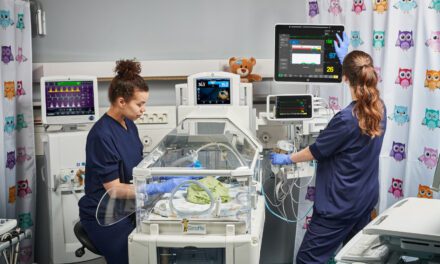Royal Philips has announced FDA 510(k) clearance to market its ElastQ Imaging capability, further expanding the functionalities of its EPIQ family of ultrasound systems.
ElastQ Imaging enables simultaneous imaging of tissue and assessment of its stiffness, which is essential for the diagnosis of various liver conditions. With ElastQ Imaging, clinicians have a comprehensive solution to assess and diagnose liver conditions without the pain or expense of a liver biopsy. Using shear wave elastography to focus sound waves to assess soft tissue stiffness, ElastQ Imaging is non-invasive, reproducible, and easily executed.
Liver disease, which includes hepatitis B and C, liver cancer and cirrhosis, is a growing global health issue due in part to rising obesity rates and an aging population. Non-alcoholic fatty liver disease affects approximately 20% of the global population. According to the World Health Organization, total deaths worldwide from cirrhosis and liver cancer rose by 50 million per year over the last two decades, and many cases continue to go undetected.
To determine the stage of liver disease and damage, a liver biopsy is typically performed by extracting a small piece of liver tissue for microscopic examination. Research suggests that instead of costly and painful biopsy procedures, ultrasound exams using shear wave elastography could become routine for assessing liver disease status and may reduce or avoid the need for conventional liver biopsies.
“Philips aims to provide the tools necessary for assessing and managing chronic conditions that so many people face, and liver disease is no exception,” says Vitor Rocha, ultrasound business leader at Philips. “We know that liver disease is a growing health concern around the globe, and we are committed to pioneering innovations like ElastQ Imaging to create our ultimate ultrasound liver solution that offers exceptional clinical performance, further improving patient care.”
Philips ElastQ Imaging shear wave elastography offers a large field of view or region of interest, color-coded quantitative assessment of tissue stiffness, real-time feedback and intelligent analysis, and quantitative measurements with multiple sample points.
In addition to ElastQ Imaging, Philips’ ultimate ultrasound liver solution is comprised of a suite of features that make it a powerful tool for clinicians, including PureWave transducer technology, delivering high image quality and increased penetration in technically difficult-to-image patients, and contrast enhanced ultrasound, providing confidence in liver lesion detection and characterization.
For more information about this product, visit Philips.





